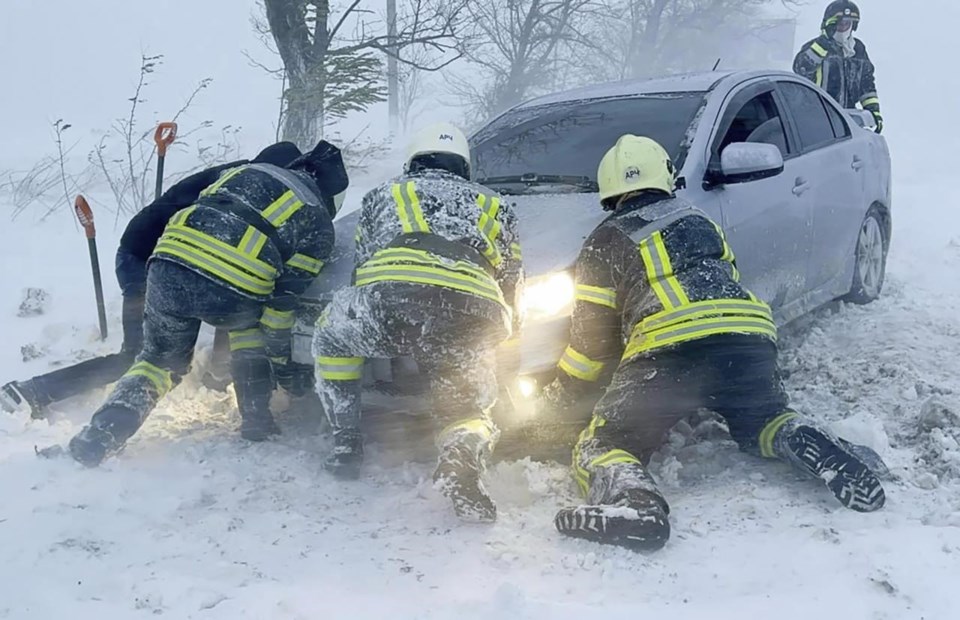A weekend storm that pounded the Black Sea region toppled trees, tore down power lines and flooded coastal areas of southern Russia and Ukraine, leaving more than a half-million people without power Monday, officials and media reports said.
The Moscow region, meanwhile, was blanketed with snow that piled drifts up to 25 centimeters (almost 10 inches), three times heavier than normal, the Tass news agency said.
The storms were part of a weather system that created blizzard-like conditions in Romania, Moldova, Bulgaria and Serbia on Sunday, dumping snow and causing power outages and fatal traffic accidents.
Emergency conditions were declared in several regions of the Crimean Peninsula, Tatyana Lyubetskaya, a Russia-installed official at the Crimean environmental monitoring department, told Tass.
With strong winds forecast to continue Monday, Crimean officials told people to stay home as government facilities, including schools and hospitals, were closed.
The storm was one of the most powerful since record-keeping began, the head of Russia's national meteorological service told the state news agency RIA Novosti, flooding highways and forcing evacuations in low-lying areas.
Crimea was annexed from Ukraine by Russia in 2014 and is a key military and logistics hub for Russia as it pursues its war in Ukraine. It is unclear whether the storm damaged any Russian military equipment or defenses.
At least one person died in Crimea after going out to look at the waves in a village near the town of Sudak in the southern part of the peninsula, a Russia-installed official said, while other people were hospitalized or forced from their homes.
Roman Vilfand, the head of Russia’s national meteorological service, told RIA Novosti that a similar storm hit the region in November 1854 during the Crimean War and sank at least 30 ships.
The Chernomorske area of western Crimea was without water and central heating after pumping stations lost power, according to Natalia Pisareva, the head of the region. There also were reports of a problem at a gas pipeline in Saky in western Crimea.
About 800 exotic fish died from thermal shock at an aquarium in Sevastopol as cold seawater flooded the facility, the Crimea 24 TV channel and RIA Novosti reported.
Ukraine's Ministry of Energy said more than 2,000 towns and villages were without electricity in 16 regions, including Kyiv, Odesa and Mykolaiv, with more strong winds and snow predicted.
Regional officials in Odesa, one of the hardest-hit areas, said more than 1,900 people, including 138 children, had to be rescued after the blowing and drifting snow trapped them in their cars. Officials warned people to avoid travel.
In Kyiv, the winds damaged a 16-by-34-meter (53-by-111-foot) Ukrainian flag — the country's biggest — that was installed in a central area of the capital.
In southern Russia, the storm sent waves flooding into the beach resort of Sochi, tore the roof off a five-story building in Anapa and damaged homes and schools in Kuban, the state news agency said. It also caused a cargo ship to run aground near Anapa.
The Caspian Pipeline Consortium halted crude oil loading at the port of Novorossiysk on Monday as winds of up to 86 kph (54 mph) and waves of up to 8 meters (26 feet) buffeted the area.
Moscow regional Gov. Andrei Vorobyov said about 3,000 people worked to clear the streets after the heavy snowfall.
In Serbia, the snowstorm cut off villages and left thousands without power. A 53-year-old man was reported missing Sunday in central Serbia and the search for him is continuing, RTS state television reported.
In Bulgaria, the storm dumped up to 40 centimeters (almost 16 inches) of snow and downed power lines and closed schools. More than 1,000 people had to be rescued from their vehicles.
The Associated Press



